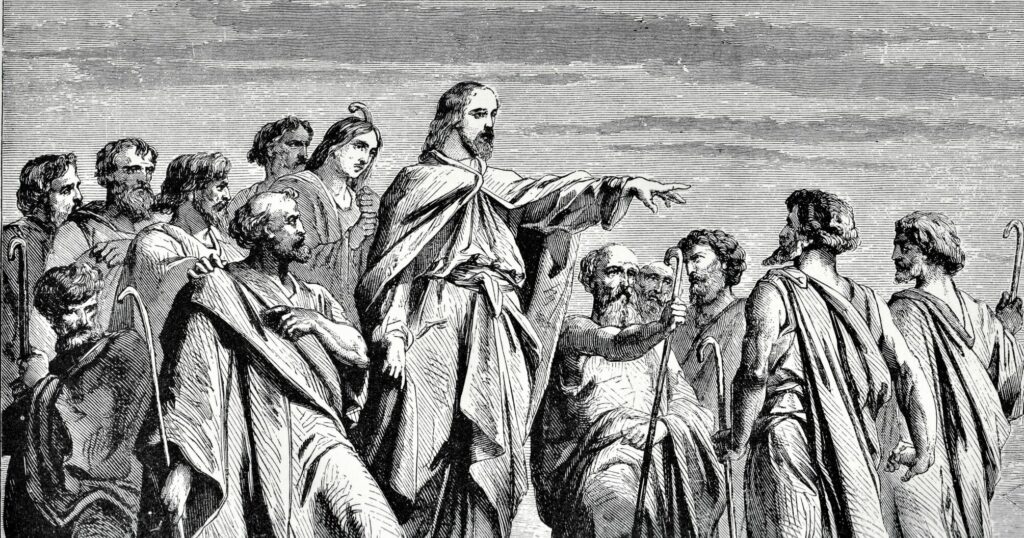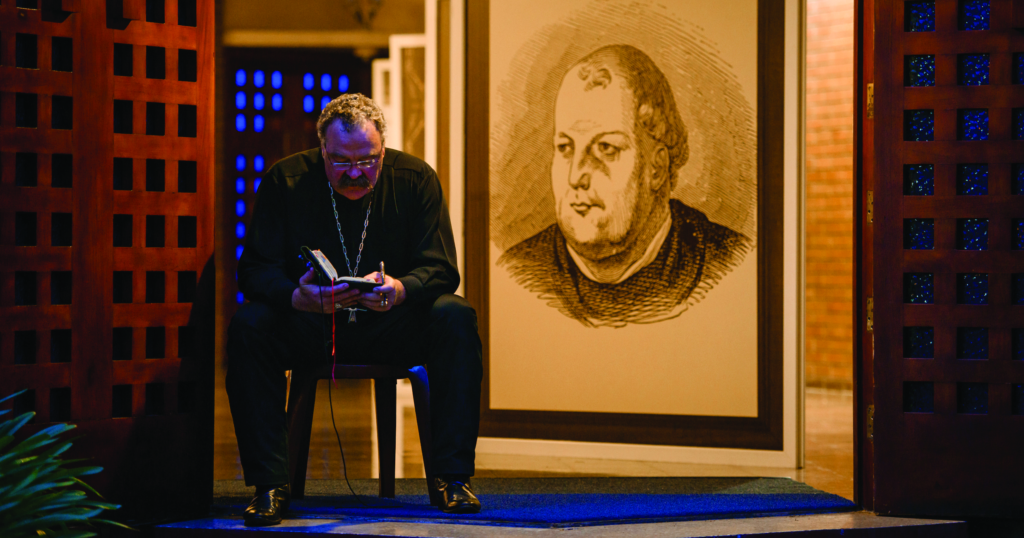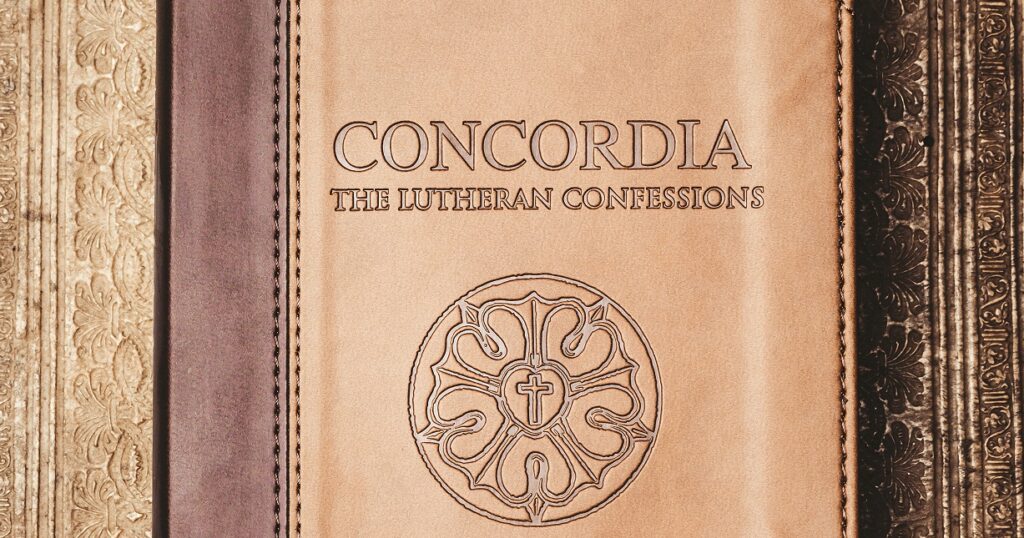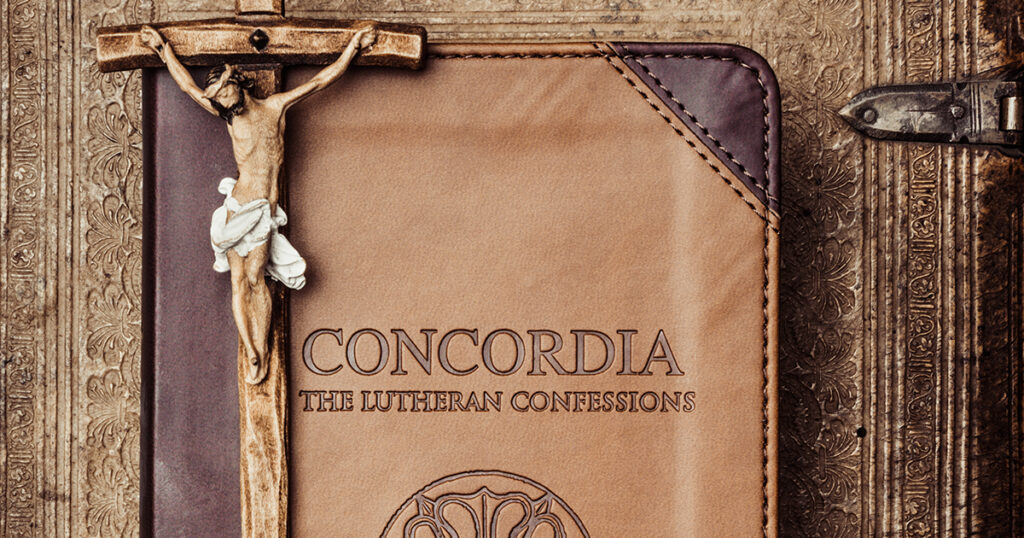by Matthew C. Harrison
But who do you say that I am?” (Matt. 16:15). Christ confronts every person and forces a confession. Peter, answering for the apostles, got it right: “You are the Christ, the Son of the living God” (Matt. 16:16). Jesus followed with a prediction of His suffering and death, and Peter wouldn’t have any of that. He thought it was a denial of what he had just asserted. To be the Christ, to be the Son of God, means going to the cross for the sins of the world. In return, Jesus gave Peter the starkest rebuke in the New Testament: “Get behind Me, Satan! … For you are not setting your mind on the things of God, but on the things of man” (Matt. 16:23).
When confronted by the Word of God, which is to say, the testimony or witness of Jesus’ person, a confession is required. “Everyone who [confesses] Me before men, I also will [confess] before My Father who is in heaven” (Matt. 10:32). To confess Jesus is to confess something about self. John the Baptizer gave a marvelous testimony in two ways. He pointed to Jesus and said, “Behold, the Lamb of God, who takes away the sin of the world” (John 1:29). It is such a great confession it got put into our Sunday liturgy. And then just as remarkably, John the Baptizer confessed something about himself when he was asked, “Who are you?” He said,
“I am not the Christ” (John 1:19, 20). And they asked him again, and he said, “No.” To confess Jesus and His forgiveness won on the cross and distributed in preaching and Baptism and Lord’s Supper is to confess: “I am nothing. Jesus is everything. My sin is His. His righteousness, in fact everything He is and did and does, is now mine.” O happy exchange!
When we speak of Jesus, it is a confession.
At first the confession of Jesus was a witness, in particular, an eyewitness. The Gospels are careful eyewitness accounts. The rest of the New Testament is careful apostolic testimony of Christ by either apostles (eyewitnesses of Jesus, His death and His resurrection) or those directly connected to them. And these eyewitnesses testified. They bore witness as witnesses at a trial testify to what happened. There are beautiful vignettes in the New Testament of this witness, which is a confession. The woman at the well spoke with Jesus, and then she told her friends and neighbors. “Many Samaritans from that town believed in Him because of the woman’s testimony” (John 4:39).
The New Testament settled in on a magnificent word for this public testimony of Jesus. In the original Greek, the word is homologeo. It means “to say the same thing.” It means for us to confess back to God and to others what God and His Christ have said about Himself. In fact, the word confession is the very same word in Latin: confessio. St. Paul uses the term: “If you confess with your mouth that Jesus is Lord and believe in your heart that God raised Him from the dead, you will be saved. For with the heart one believes and is justified, and with the mouth one confesses and is saved” (Rom. 10:9–10). The word is used in the New Testament confession of sins (1 John 1:9), the confession of the content of the faith (1 John 4:2) and the confession of the praises of God (Matt. 11:25 [often translated “praise” or “thank” here]; Rom. 15:9).
The Lutheran church continues this confession today. The title page of the 1580 edition of our Lutheran Book of Concord contains this title: “Concordia: Christian, Repeated, Unanimous Confession.” It is “repeated” because the book contains the Augsburg Confession and the Formula of Concord, the latter of which simply reasserts the teaching of the Augsburg Confession and notes how the Augsburg Confession should be rightly understood and confessed. The title of the Augsburg Confession is simply, “Confession [Bekentnus in the old German spelling, which means “confession”] of the Faith.” In laying out the teaching of the Bible and the Lutheran church, the Formula of Concord repeats over and again: “We believe, teach and confess…”
The Book of Concord is also called “Concordia,” which literally means “hearts united.” After Luther’s death, 30 years of confusion reigned before real and extensive unity was reached and confessed via the Book of Concord. We have seminaries, universities, churches, health plans and more named “Concordia.” To be sure, that means “hearts united,” but our forefathers named these institutions with a full-throated confession of the “Concordia,” the Book of Concord. (If you don’t have a Book of Concord, you can obtain several versions from cph.org, including a nice little “pocket version” paperback. I recommend the larger Reader’s Edition.) This is our confession, our answer to Jesus’ question: “Who do you say that I am?”
Hold fast the confession! (Heb. 4:14)
–Pastor Matthew C. Harrison
For more on confession in Scripture, see Matthew 3:6; 7:23; 10:32; 11:25; 14:7; Luke 22:6; Acts 19:18; Romans 14:11; 15:9; Philippians 2:11; James 5:16; John 1:20; 9:22; 12:42; Acts 7:17; 23:8; 24:14; Romans 10:9; 1 Timothy 6:12; Titus 1:16; Hebrews 11:13; 13:15; 1 John 1:9; 2:23; 4:2; 2 John 7; Revelation 3:5; 2 Corinthians 9:13; 1 Timothy 6:12; Hebrews 3:1; 4:14.






